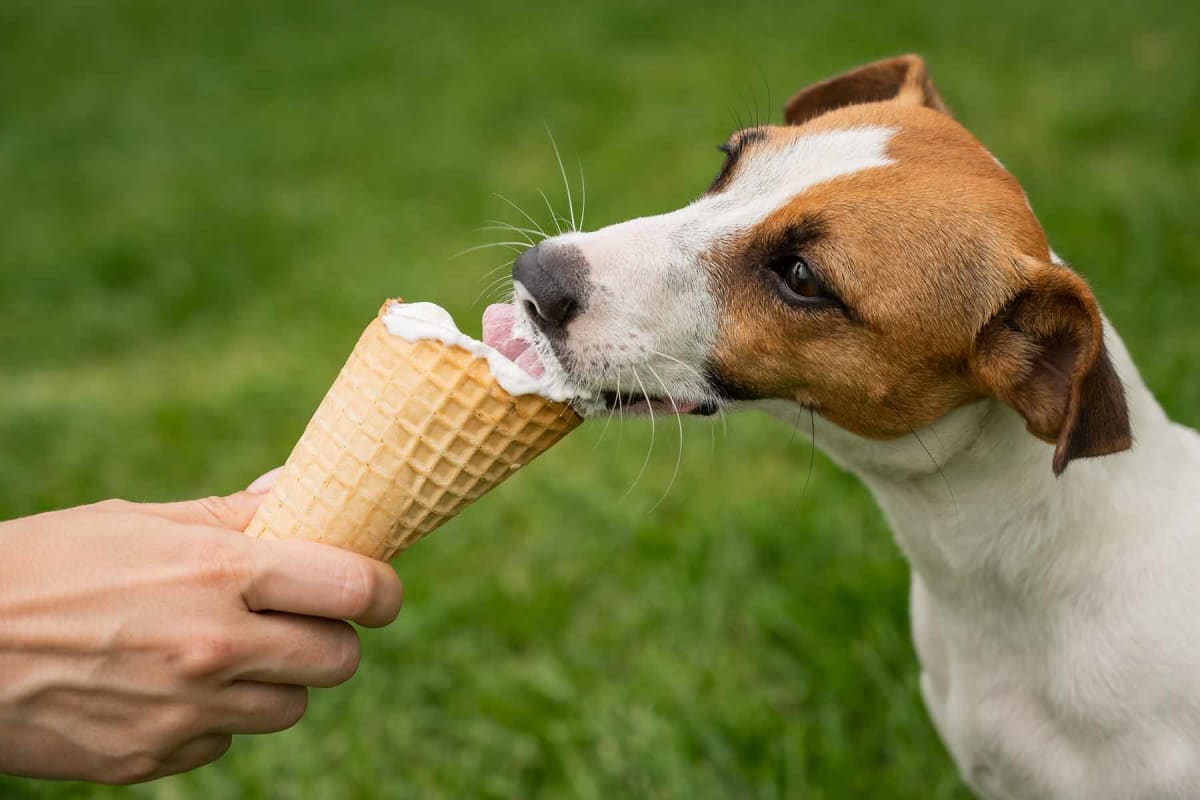
Can dogs eat ice cream?
Can dogs eat ice cream?
Can dogs have ice cream?
On a hot day, it's hard to resist sharing a cool treat with your furry friend. But when it comes to ice cream, you might be wondering: can dogs eat ice cream? The short answer is: no, it's not recommended. Most experts agree ice cream is not a safe or healthy snack for dogs.
While a tiny lick probably won't cause immediate harm to most dogs, regular ice cream consumption can lead to several health issues. Beyond lactose issues, many ice creams contain high amounts of sugar, artificial sweeteners, chocolate, and other ingredients that range from unhealthy to fatally toxic for dogs.
Is ice cream bad for dogs?
Yes, ice cream can be bad for dogs for several reasons:
Lactose intolerance: Many dogs struggle to digest lactose, leading to uncomfortable gastrointestinal symptoms. Even small amounts of dairy can trigger reactions in sensitive dogs.
High sugar content: Commercial ice cream typically contains significant amounts of sugar. Dogs don't need added sugars in their diet, and consuming too much can contribute to:
Weight gain and obesity
Dental problems
Diabetes risk
Hyperactivity followed by energy crashes
Dangerous ingredients: Some ice cream flavors contain ingredients that are toxic to dogs:
Chocolate contains theobromine, which dogs cannot metabolize effectively.
Xylitol, an artificial sweetener found in some "sugar-free" ice creams, is extremely toxic to dogs.
Macadamia nuts, coffee, and certain other flavor add-ins can also be harmful.
Fat content: Ice cream's high fat content can trigger pancreatitis in some dogs, a painful inflammation of the pancreas that can be serious and even life-threatening.
Even if your dog seems fine after eating a little ice cream, it's not a risk worth taking. The potential for stomach upset, allergic reactions, or exposure to toxic ingredients makes ice cream a poor choice for pups.
What to do if your dog eats ice cream
If your dog has consumed a small amount of vanilla ice cream without chocolate or artificial sweeteners, they'll likely be fine. Provide plenty of fresh water and monitor them for signs of digestive upset like vomiting or diarrhea.
However, immediate veterinary attention is needed if:
Your dog ate chocolate ice cream (especially dark chocolate varieties).
The ice cream contained xylitol or other artificial sweeteners.
Your dog consumed a large quantity of ice cream.
Your dog has existing health conditions like diabetes or pancreatitis.
You notice symptoms like excessive thirst, lethargy, tremors, or collapse.
When in doubt, contact your veterinarian or an emergency pet poison hotline. The ASPCA Animal Poison Control Center (888-426-4435) can provide guidance in emergencies.
Safer alternatives to ice cream for dogs
You don't have to leave your pup out of the fun! There are plenty of healthy, dog-friendly frozen treats that are both safe and delicious:
Commercial dog-friendly ice cream: Several companies make frozen treats specifically formulated for dogs. These products typically avoid problematic ingredients while providing a safe, cold treat.
Homemade frozen dog treats: Making frozen treats at home lets you control exactly what goes into your dog's snack. Some options include:
Blend plain, unsweetened yogurt and freeze in bite-sized dollops on a cookie sheet (look for varieties with active cultures, which are easier for dogs to digest).
Freeze small portions of low-sodium chicken broth.
Puree fruits dogs can eat like apples (without the core and seeds), blueberries, strawberries, pineapple, or banana and freeze in ice cube trays.
Mix xylitol-free peanut butter with mashed banana and freeze inside a Kong or similar chew toy.
Frozen fruits as treats: Some fruits make excellent frozen treats for dogs without any blending needed, including:
Frozen blueberries
Watermelon chunks (seeds removed)
Sliced strawberries
Banana slices
Always introduce new foods gradually and in small amounts to ensure your dog tolerates them well. Remember, when it comes to treats of any kind, moderation is key. Treats should make up no more than 10% of your dog's daily caloric intake to maintain a balanced diet.
Consult with your veterinarian if you have questions about your specific dog's dietary needs, especially if they have existing health conditions or food sensitivities. Your pup's health and happiness are worth it, and with so many tasty, safe options, you'll both be able to enjoy a cool treat together, worry-free.